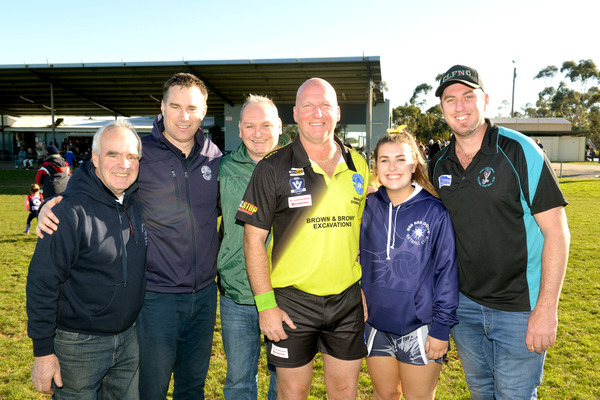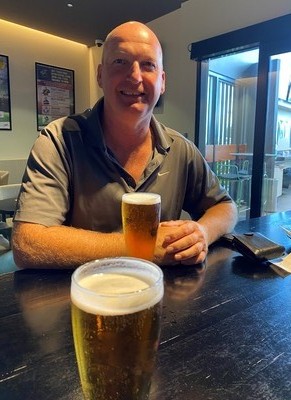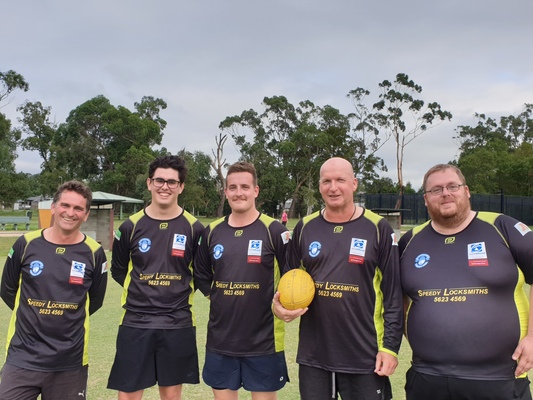
From playing, to coaching, to serving as a club president, to taking a role on the WGFNC advisory committee – Steve Goodie has done the lot when it comes to footy. He’s given years of his life to the game, and the game was there for him in his darkest hour. Now, he’s taking on his latest footy challenge – as coach of the Gippsland Umpires Association. He played over 400 games, but through umpiring he’s seeing the game in a completely different light – as RUSSELL BENNETT discovered…
***
Russell Bennett: Steve, how did you get involved in umpiring after you’d played over 400 senior games, you’d coached seniors and juniors, been involved in the junior pathway system, and you’d been a club president? For a lot of people in footy, the umpires are the enemy (laughs)…
Steve Goodie: Yes, that’s right. I got involved when my wife Carolyn fell ill (before she ultimately lost her battle with melanoma). I was driving one of our daughters to netball and the Gippsland Umpires Association was short on umpires back then, so I chose to umpire footy while she played netball.
After that, our daughter Chloe got involved as a boundary umpire and after we lost Carolyn, Chloe and I umpired together for about 12 months while Alex – my other daughter – continued to play netball and then we started to get back on our feet.
For me, umpiring became a social outlet for me during a pretty tough period.
RB: We’ve spoken about this a number of times mate, and done a few stories on it, but I can still only imagine how tough that period must’ve been for you…
SG: Yeah, it definitely was Russ, but umpiring got me out of the house again. I ultimately learnt that you can’t just mope around and wish life was different. The harsh reality is that won’t change anything. You’ve got to start living again, so umpiring gave me an outlet that I could handle, while still parenting the girls.
RB: And it would have been really important that it was in an environment you knew so well, too – the footy world…
SG: That’s right, and I could still parent the girls without being over-committed at the time because I umpired a lot of junior games.
On Saturdays I could umpire, and I suppose as we developed through those different stages of grief together, I started to get more involved and then halfway through my second year I started to umpire senior games and develop from there too.
RB: As hard as that time was for you and the family mate, you clearly found a genuine passion for umpiring, didn’t you?
SG: Yeah I found it rewarding from a kind of match-management side of things – trying to make sure that the game ran well and there were no incidents, and that the game could be played on its own terms depending on how the sides were playing. If the two sides play hard but fair, that’s fantastic.
RB: Clearly umpiring these days in the modern game is almost an art form in itself. It must be so tough to not get over-involved, but also make sure the game is played the way it should be…
SG: It is a balancing act because coaches will push the boundaries as far as they can, and I know that from my playing and coaching days. Coaches will also work on what they perceive to be an umpire’s weakness, and if they can get an advantage. Players will do the same.
As an umpire, you need to learn to know when to stand up for yourself without going too far.
The fact is, the longer you look at the rules for, the more they seem black and white. But there’s so much that’s open to interpretation. Do you pull up the slightest hold early, or do you let the game go – particularly if the game’s being played in the right spirit?
RB: And depending on your interpretation, that can set an entirely different tone for a game can’t it?
SG: Yes, absolutely. If you make your affirmative decisions in the first quarter, they’ll ultimately be forgotten. Don’t stamp your authority in the last minute where the game could be won or lost on a 50-metre penalty.
RB: And you would have seen that unfold from all angles – being involved as a player, a coach, a president, and now an umpire. Clearly you’ve heard and seen it all before. How do you react, generally, when a player may be getting carried away and potentially confrontational?
SG: Honestly, I’ll probably tell them to pull their heads in and perhaps even give a bit back. It’s a real issue in footy, and it’s becoming something that really weighs on umpires a lot.
RB: And do you think sometimes it’s enough to make umpires gun-shy, and even turn away from the game?
SG: Yes, I do. As an umpire, I don’t necessarily mind a player questioning my decision. But I don’t want him to question my decision at, say, the five-minute mark of a game, and then keep on about it for the rest of the game and say things like “that push in the back was nowhere near as harsh as mine”, “that hold was worse than mine”… ask about it, forget about it, and move on. Treat everything on its merits.
There could be countless decisions that need to be made in a split second, and we have to make one, or none, and a non-decision is still a decision in its own right.
They’re not all going to be right. I understand players and coaches ask for consistency, and we try to deliver that, but we’re still human.
As a player, I never really looked at it like that, and honestly I would have been a better player if I’d umpired first because I would have respected the umpires a lot more.
That said, I’ve probably become a better umpire by playing first because I understand the players’ frustration so I try not to take what they say personally.
RB: It’s probably hard in the course of a game because you’ve no doubt got too many other things to worry about, but do you ever find yourself thinking about how you might’ve reacted to certain calls as a player?
SG: Not really. I get lost in the game, and the thing is that – as a player who’s become an umpire – it’s clear to me that players often don’t respect how seriously the umpires take the game.
From a player’s perspective, they probably don’t often think about the hard work involved in umpiring. I think there’s a perception that when an umpire might make a bad call, he or she will just forget about it.
But it actually weighs on your mind and you have to learn to carry that decision, and there’s nothing you can do about it.
Think of it this way – if a player drops a mark in the goal square with 20 seconds to go in a game and they lose by less than a goal, that becomes their mistake that they have to carry. But that’s the beauty of footy – there’s so often the chance to redeem yourself the following week.
Sometimes players just think umpires don’t care, but as an umpire you can make one bad decision five years ago and it might never be forgotten.
I’m happy for people to ask a question about my umpiring, if they respect the answer. Football is an emotional game and, as umpires, we have to appreciate that emotion, but by the same token people can’t justify their actions just because they were emotional at the time. Don’t come and yell at an umpire, and then try to justify it because you were emotional.
RB: The simple fact is, the game can’t happen without umpires – and we know that because of the shortages in different parts of the country…
SG: And when you have to have club umpires out there, that’s really tough – because they’re often criticised by people from their own club even harder than by the opposing club.
RB: Clearly – as you’ve shown, mate – a great way to get into umpiring is through prior experience in footy, whether it be as a previous player, coach, president, you name it…
SG: It definitely helps the development of an umpire when he or she already has a really strong understanding of the game, and having a playing background helps… but there is a stigma to umpiring still.
RB: Do you think that’d be removed if more ex-players put their hands up to umpire?
SG: Yes, of course, but it’s very much an old school way to say to players or former players ‘if you don’t like how the umpires do it, why not put your hand up?’. What I found early on is that it’s easy enough to go out and umpire one or two games, but it’s when you get a block of one, two, three, four, five, six, week-after-week that you really need to be on your toes.
It really is an interesting involvement in the sport.
RB: Be honest here mate, when you played what was your relationship like with the umpires?
SG: Oh I didn’t have one – I was just so competitive. I would have been better to the umpires having umpired first. I would have respected that it’s not personal.
Because I was so competitive, the ones that were black and white frustrated me – like yes, that was a free kick, but gee there was nothing in it.
That’s not the right attitude though.
RB: Talk me through your playing career, Steve, and where you played…
SG: I started at Gembrook Cockatoo, then went to Vermont, then to Upwey Tecoma, then Cora Lynn – where I coached, then ROC (now Officer), before I went back to Upwey Tecoma and coached there, and then went back to Gembrook where I finished up and then became president there for 10 years.
RB: And you played in 10 grand finals, won seven premierships, and played over 400 games didn’t you?
SG: Yeah, that’s right – 400 if you include interleague and the like.
RB: I know how incredible your footy resume is because we’ve spoken about it before, but that – in itself – isn’t something people would think of if they hadn’t met you prior to your umpiring involvement…
SG: Yeah, I have seen, done, and heard it all before and it’s something that’s helped me. I umpired an under-18s game once and had a young kid say ‘what would you know?’. I couldn’t help it – I think I said I’d won more games than he’d had hot meals (laughs).
What I’ve found is that in Ellinbank and further into Gippsland no one knows me, and I don’t mind that at all.
In West Gippy – throughout Garfield, Cora Lynn, Nar Nar Goon, Bunyip, and Koowee – there are still enough people who remember me from my playing days.
As an umpire heading to a game, I don’t look at where the sides are on the ladder and I don’t know the players. I’m a harsh judge of footballers, too – and this is all deliberate. I don’t want to be compromised at all.
I know you’re into your cricket mate, so think of it like this – don’t field at first slip if you don’t want the ball to come your way. It’s the same when you put your hand up to umpire – that’s the pressure you’re under for nearly 120 minutes, and you need to embrace that because there’s no hiding out on the ground.
As a player I used to focus on winning the hard ball because you’re only going to take a big mark and kick a goal after the siren maybe once in your career if you’re lucky, but there are a million hard balls to get.
As an umpire, I visualise how I’m going to react so that I can stay cool and calm.
What I really want to pass on to the other umpires – particularly the younger ones – is to be ready for what’s coming, and embrace it.
I used to wonder why umpires would sometimes not answer questions from players, and there’s a reason – because when they’re talking to you, they could miss the next decision and then it snowballs and the crowd gets angrier. It’s about 100 per cent concentration.
RB: So when you’re training, as umpires, how do you bring in drills that test that concentration?
SG: That’s the hard part – you can’t really replicate what’s going to happen out on the ground.
I did an umpire development course just the other week and what they’re developing and improving at AFL level is amazing.
They’ve got all this GoPro footage, for example, from umpires actually in games – that’s gold to be able to analyse umpires’ performances. We need to bring that sort of thing into the lower levels.
The research has shown that the more games you’ve umpired and the more decisions you’ve made, the better you can see the play unfold and therefore your peripheral vision will widen. We need to improve that in grassroots footy.
RB: You’ve taken on the umpires head coaching role with the Gippsland Umpires Association, Steve. How did that come about – taking that next step?
SG: To be honest mate, when I lost Carolyn I lost all my enthusiasm for community involvement – you just go into a kind of shutdown mode and into a kind of numbness. I’m really proud of the involvement we both had in the community – so proud – and the time we spent together as a family doing what we did, and after a while does get back to normal… a new normal.
The attraction of me wanting to teach people more about the game really came back to me, but I didn’t want to do it at a club level any more.
As people – particularly as blokes – we need outlets to go and belong to something, and to be able to be ourselves. That’s what we try and create through umpiring – in the same way footy clubs do. Football helped me so much with what I went through, so after discussing the next move with my (current) partner, Veronica, the role came up to apply for and I jumped at it.
I’m coming to this with a wide-ranging footy background, which might be a little bit different to what some of the umpires are used to. I’m just grateful for the GUA for taking a punt on me.
RB: Mate, I’ve got no doubt you’ll have a huge impact in this role, just as you have in all your other roles in footy. Thanks for the chat – it’s been fascinating…
SG: Cheers Russ.
***
Those interested in getting involved in umpiring should contact Nick Frost at secretary@gua.net.au








